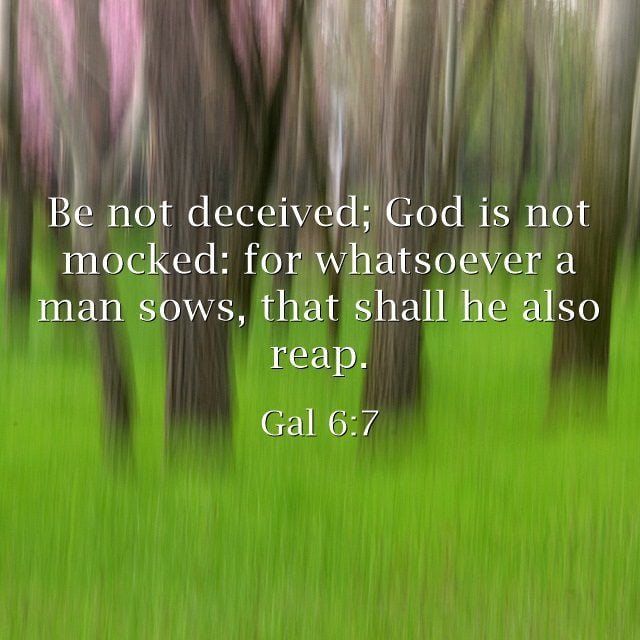What does the Bible mean by saying you reap what you sow? What is the application for the believer today?
Sowing Comes First
I live in the largest wheat producing state in the nation and the farmers here know that you must sow before you reap but you reap much later than you sow but you also reap much more than you sow. Paul wrote “Do not be deceived: God is not mocked, for whatever one sows, that will he also reap” (Gal 6:7). Farmers here sow wheat and its wheat they get and Paul, in writing about the same principle wrote, “For the one who sows to his own flesh will from the flesh reap corruption, but the one who sows to the Spirit will from the Spirit reap eternal life” (Gal 6:8). You can’t fool nature any more than you can fool God. If you sow fleshly acts, you’ll reap fleshly corruption but if you reap to the Spirit, you’ll not only reap godly fruit but you’ll also reap eternal life someday. That’s why Paul encouraged us to not “grow weary of doing good, for in due season we will reap, if we do not give up” (Gal 6:9). The farmer is patient and doesn’t grow weary, for in due season or at the time of harvest, the farmer reaps the crop and he or she does not give up.
Reaping Comes Later
God was concerned with the poor and aliens (or strangers) and included in the law that “When you reap the harvest of your land, you shall not reap your field right up to its edge, neither shall you gather the gleanings after your harvest” (Lev 19:9) “nor shall you gather the gleanings after your harvest. You shall leave them for the poor and for the sojourner: I am the Lord your God” (Lev 23:22) and that law was obviously for the poor who would then have food enough to survive. If someone forgot a sheaf in the harvest, the law said “When you reap your harvest in your field and forget a sheaf in the field, you shall not go back to get it. It shall be for the sojourner, the fatherless, and the widow, that the Lord your God may bless you in all the work of your hands” (Duet 24:19).
The Law of the Sower
The law of the sower is this; “As I have seen, those who plow iniquity and sow trouble reap the same” (Job 4:8) and “Whoever sows injustice will reap calamity, and the rod of his fury will fail” (Prov 22:8). Conversely, if there is “a sowing of peace. The vine shall give its fruit, and the ground shall give its produce, and the heavens shall give their dew” (Zech 8:12) and “The wicked earns deceptive wages, but one who sows righteousness gets a sure reward” (Prov 11:18) for “He who supplies seed to the sower and bread for food will supply and multiply your seed for sowing and increase the harvest of your righteousness” (2nd Cor 9:10). One thing is certain, God hates “a false witness who breathes out lies, and one who sows discord among brothers” (Prov 6:19).
Reaping what you Sow
Some people make excuses for not sowing for God’s purposes so those “who observes the wind will not sow, and he who regards the clouds will not reap” (Eccl 11:4) so they should not expect any harvest where there is no trust in God to sow. God gives us an encouraging word through Amos the prophet “Behold, the days are coming,” declares the LORD, “when the plowman shall overtake the reaper and the treader of grapes him who sows the seed; the mountains shall drip sweet wine, and all the hills shall flow with it” (9:13) and then “The threshing floors will be filled with grain; the vats will overflow with new wine and oil” (Joel 2:24) but that day is not yet. Jesus promises that “Even now the one who reaps draws a wage and harvests a crop for eternal life, so that the sower and the reaper may be glad together. Thus the saying ‘One sows and another reaps’ is true. I sent you to reap what you have not worked for. Others have done the hard work, and you have reaped the benefits of their labor” (John 4:36-38). That’s why “we must help the weak and remember the words of the Lord Jesus, how he himself said, ‘It is more blessed to give than to receive’” (Acts 20:35).
Sowing in Tears, Reaping in Joy
Life is full of trials, tribulations, pain, and suffering but “Those who sow in tears shall reap with shouts of joy” (Psalm 126:5) because “He who goes out weeping, bearing the seed for sowing shall come home with shouts of joy, bringing his sheaves with him” (Psalm 126:6). In other words, tears of pain make great fertilizer for the seed we’ve sown. Sowing in tears is reaping in joy.
Conclusion
Jesus gave a great definition and outcome of reaping what we sow when He said “give, and it will be given to you. Good measure, pressed down, shaken together, running over, will be put into your lap. For with the measure you use it will be measured back to you” (Luke 6:38) because “Whoever is kind to the poor lends to the LORD, and he will reward them for what they have done” (Prov 19:17). Don’t you want that kind of harvest?
Article by Jack Wellman
Jack Wellman is Pastor of the Mulvane Brethren church in Mulvane Kansas. Jack is also the Senior Writer at What Christians Want To Know whose mission is to equip, encourage, and energize Christians and to address questions about the believer’s daily walk with God and the Bible. You can follow Jack on Google Plus or check out his book Blind Chance or Intelligent Design available on Amazon.












